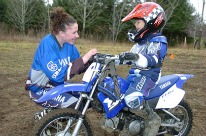When is the host of a cookout or other gathering of multiple families liable for injuries suffered by a child who is not his or her own?
The Virginia Supreme Court clarified this tricky issue of civil law when ruling on October 31, 2014, that a host who makes sure the injured child’s parents know what the youngster is doing and has ensured the child has permission to engage in a possibly harmful activity has done enough to satisfy the legal standard of “reasonable care.” The decision in Lasley v Hylton also addresses issues of contributory negligence on the part of children younger than 14 and the responsibilities of both custodial and noncustodial parents who are in the same location as their child when an injury occurs.

The case and its outcome have received attention throughout the United States, even though its effect only has strict legal weight in Virginia. According to New York City-based personal injury lawyer Nicholas Rose, the separated parents of an 8-year-old girl filed suit against the owner of an all-terrain vehicle who allowed the child to ride the four-wheeler. Warning stickers on the vehicle stated that no one under the age of 12 should operate it, and the girl broke her shoulder when she rolled the ATV over after losing control.
The ATV owner had been hosting a barbecue on his property in Botetourt County, VA, and had let several youngsters in attendance take turns on the four-wheeler. At trial, on appeal and before the Virginia Supreme Court, he defended himself by claiming that the injured child should have been able to read and heed the safety warning, that her parents consented to her operating the ATV and that the mother and father were close enough to protect her from taking unsafe actions.
Lower courts agreed with the defendant, as did the justices of the highest state court. In their majority decision, the justices wrote, “We hold that if a child’s parent is present and supervising, and knows or should know of open and obvious risks associated with an activity, a host does not breach the duty of reasonable care when he or she allows the child to participate in an activity with the parent’s permission.”
This determination goes a good way toward settling a range of questions regarding an area of civil law known as homeowners’ liability — or, in the case of businesses, premises liability. Defined as simply as possible by FindLaw, “property owners and possessors owe different degrees of responsibility, or duties, to [people] who come onto their property.” As generally interpreted, the duty of care extends to keeping structures, possessions and grounds in proper repair and under control in order to prevent accidental injuries or deaths.
By ruling as they did in this homeowners’ liability case, the justices of the Virginia Supreme Court made it clear that when some other parent or adult has involvement in injuring a child from another family, but the child’s actual parents are present when the injury occurs, the homeowner cannot automatically be held responsible. Also, while Virginia law has long set forth that children between 7 and 14 year years of age may be excused from findings of contributory negligence, a defendant has a legal case to make regarding whether an injured child knew he or she was doing something dangerous. The principle that children younger than 7 are incapable of contributing to their own injuries by acting negligently remains intact.
EJL







